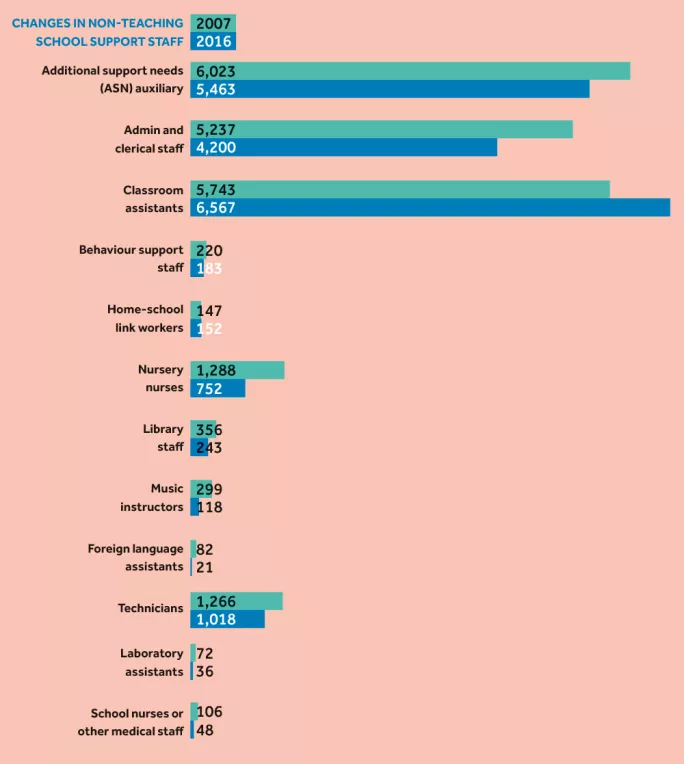
Supplies and support have left the building

Support staff and supply teachers as endangered species; music, reading clubs and study groups withering on the vine; teachers and parents reaching into their own pockets for resources as prosaic as glue sticks and as essential as textbooks - teachers are decrying life in Scottish schools as they contend with budget cuts.
Frustration is the overriding sentiment in comments received by the Voice Scotland union, shared with Tes Scotland, with some staff even “ashamed” by the quality of education they are now able to provide pupils.
As one member of support staff puts it: “I love my work and the variety of it but the job is changing. It is hugely frustrating to not be able to give colleagues the support they need.”
The Scottish government played down the feedback, which was provided by 69 educators. But the often emotional responses - from teachers, support staff, early-years practitioners and school management - reflect the hard data on the dwindling staff and resources at schools’ disposal.
Teachers report feeling “demoralised” at falling numbers of staff, with support teachers and assistants often not replaced and those remaining regularly asked to cover classes since supply teachers are “like gold dust”.
Donated glue sticks
One teacher says their school is 15 teachers down and that there are “nowhere near enough staff in our school to address closing the attainment gap”. Another member of support staff reports a school technician team cut by 40 per cent. Schools were also trying to get by with fewer cleaners, janitors and clerical staff.
A teacher says: “Not only are the staff stretched, but we are desperate for even the basics, such as paper and art materials. Some learning experiences don’t happen because we don’t have the resources…some parents have even donated glue sticks, etc.”
Another teacher says: “There is not enough money to buy new textbooks, and so we are not able to send books home for further practice of a skill. The online resource we have been using - Edmodo - has been taken away.”
Pupils preparing for crucial exams are not immune: there are reports of less teaching time for Advanced Higher pupils as transport cuts make it harder to get to other schools that offer their subjects, and of costly science experiments being scrapped.
Music is being “removed” from some schools, and extracurricular clubs are disappearing because staff cannot find the time.
“My faculty used to run a writers’ group and a reading club, but no longer,” says one member of a school management team. Another senior member of staff says: “Things like Duke of Edinburgh’s Award are increasingly difficult to sustain.”
Many report that children with additional support needs (ASN) are suffering - or that if they devote the necessary time to those pupils, others will be neglected.
Voice Scotland senior professional officer Dougie Atkinson said the comments “paint a bleak picture of the ability of our schools to meet the challenges of delivering a quality educational experience for children in Scotland.
“Instead of raising attainment and improving standards, sustained squeezing of resources has diminished our schools to the point that many are barely able to provide more than a basic curriculum.”

He added that “children with additional support needs are suffering the most”, and that pupils who cannot afford tutors or do not have supportive parents will fall further behind.
“So much for closing the attainment gap,” said Mr Atkinson. “There is deep dissatisfaction among teachers and support staff alike.”
Kenny Graham, a teacher who represents campaigning organisation the Scottish Children’s Services Coalition, said the comments were “not surprising in the least and bear out the findings from other organisations”.
Despite a 44 per cent increase in ASN pupils since 2012, local authority spend per pupil had been cut by more than 11 per cent in that time, he said.
‘A lost generation’
“The feedback should act as a wake-up call for the Scottish government and local authorities,” said Mr Graham. “There is a crisis in the education system for those with ASN. Unless we act now and invest in their education, we are going to be left with a lost generation of vulnerable children and young people.”
A Scottish government spokesman said that the feedback was “disappointing”, but based on a “very low number” of responses.
He added: “Improving the education and life chances of our children is our number-one priority, and tackling bureaucracy and addressing excessive teacher workload continues to be a key theme of our bold education reforms.”
The spokesman said: “This year alone, we have invested £88 million so every school can access the right number of teachers and £750 million over the course of this parliament to close the poverty related attainment gap. In 2017-18, this includes £120 million of Pupil Equity Funding, to be spent at the discretion of headteachers on additional staffing and resources.”
Local authorities body Cosla said it was in talks with the government over the national spending review and “will be presenting a strong case that local government cannot sustain further cuts, as experienced over the last two years, without significant impact on services and jobs, and most importantly the communities we serve to protect”.
Do these experiences match your own or do you have a different story to tell? Email us in confidence at henry.hepburn@tesglobal.com or emma.seith@tesglobal.com
You need a Tes subscription to read this article
Subscribe now to read this article and get other subscriber-only content:
- Unlimited access to all Tes magazine content
- Exclusive subscriber-only stories
- Award-winning email newsletters
- Unlimited access to all Tes magazine content
- Exclusive subscriber-only stories
- Award-winning email newsletters
You need a subscription to read this article
Subscribe now to read this article and get other subscriber-only content, including:
- Unlimited access to all Tes magazine content
- Exclusive subscriber-only stories
- Award-winning email newsletters
- Unlimited access to all Tes magazine content
- Exclusive subscriber-only stories
- Award-winning email newsletters